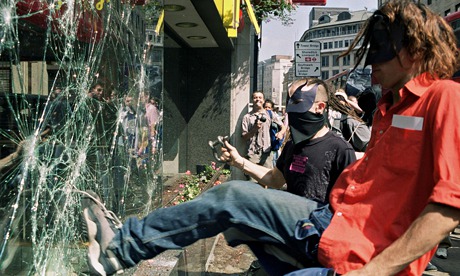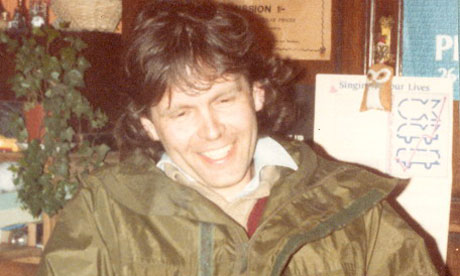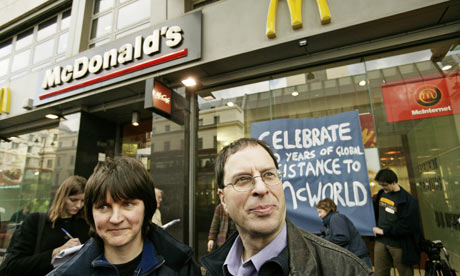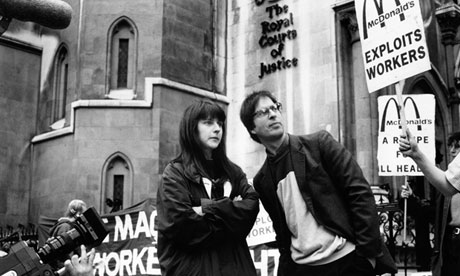Owen Jones in The Guardian
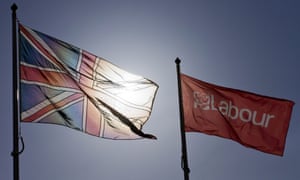
‘The British establishment has no interest in allowing a government that challenges its very existence to prove a success.’ Photograph: Justin Tallis/AFP/Getty Images
‘Do you really think the British state would just stand back and let Jeremy Corbyn be prime minister?” This was recently put to me by a prominent Labour figure, and must now be considered. Happily for me – as a Corbyn supporter who ended up fearing the project faced doom – this long-marginalised backbencher has a solid chance of entering No 10. If he makes it – and yes, the Tories are determined to cling on indefinitely to prevent it from happening – the establishment will wage a war of attrition in a determined effort to subvert his policy agenda and bring his government down.
You are probably imagining me hunched over my computer with a tinfoil hat. So consider this: there is a precedent for conspiracies against an elected British government, it is not so long ago, and it was waged against an administration that represented a significantly smaller threat to the existing order than that offered by Jeremy Corbyn’s Labour.
In the 1970s, plots against Harold Wilson’s Labour government abounded. The likes of Sir James Goldsmith and Lord Lucan believed Britain was in the grip of a leftwing conspiracy; while General Sir Walter Walker, the former commander of allied forces in northern Europe, was among those wanting to form anti-communist private armies. A plot, in which it is likely former intelligence officers and serving military officers were involved, went like this: Heathrow, the BBC and Buckingham Palace would be seized, Lord Mountbatten would be made interim prime minister, and the crown would publicly back such a regime to restore order. At the time, Wilson and his own private secretary were convinced about such a plot culminating in their arrest along with the rest of the cabinet. In Spycatcher, ex-MI5 assistant director Peter Wright openly wrote about a MI5-CIA plot against Wilson.
No, I do not believe a military coup against a Corbyn is plausible, although in 2015, a senior serving general did suggest “people would use whatever means possible, fair or foul”, including a “mutiny”, to block his defence plans. But there will be a determined operation to stop Corbyn ever becoming prime minister. The plots against Wilson were intertwined with cold war politics, and an establishment fear that Britain could defect from the western alliance. In the 1980s, the former Labour minister Chris Mullin wrote the novel A Very British Coup, inspired by the plots against Wilson, which explored an establishment campaign of destabilisation against a leftwing government. Mullin believes “MI5 has been cleared of dead wood” who would drive such plots. Maybe.
There is currently a plot to create a new “centrist” party that would secure a derisory vote share but potentially split the vote enough to keep the Tories in power. In an election campaign, the Tories will struggle with attack lines: “coalition of chaos” is now null and void, and the vitriol of the “get Corbyn” onslaught backfired. But expect a hysterical campaign of fear centred around warnings of economic Armageddon and corporate titans threatening to flee Britain’s shores.
‘Do you really think the British state would just stand back and let Jeremy Corbyn be prime minister?” This was recently put to me by a prominent Labour figure, and must now be considered. Happily for me – as a Corbyn supporter who ended up fearing the project faced doom – this long-marginalised backbencher has a solid chance of entering No 10. If he makes it – and yes, the Tories are determined to cling on indefinitely to prevent it from happening – the establishment will wage a war of attrition in a determined effort to subvert his policy agenda and bring his government down.
You are probably imagining me hunched over my computer with a tinfoil hat. So consider this: there is a precedent for conspiracies against an elected British government, it is not so long ago, and it was waged against an administration that represented a significantly smaller threat to the existing order than that offered by Jeremy Corbyn’s Labour.
In the 1970s, plots against Harold Wilson’s Labour government abounded. The likes of Sir James Goldsmith and Lord Lucan believed Britain was in the grip of a leftwing conspiracy; while General Sir Walter Walker, the former commander of allied forces in northern Europe, was among those wanting to form anti-communist private armies. A plot, in which it is likely former intelligence officers and serving military officers were involved, went like this: Heathrow, the BBC and Buckingham Palace would be seized, Lord Mountbatten would be made interim prime minister, and the crown would publicly back such a regime to restore order. At the time, Wilson and his own private secretary were convinced about such a plot culminating in their arrest along with the rest of the cabinet. In Spycatcher, ex-MI5 assistant director Peter Wright openly wrote about a MI5-CIA plot against Wilson.
No, I do not believe a military coup against a Corbyn is plausible, although in 2015, a senior serving general did suggest “people would use whatever means possible, fair or foul”, including a “mutiny”, to block his defence plans. But there will be a determined operation to stop Corbyn ever becoming prime minister. The plots against Wilson were intertwined with cold war politics, and an establishment fear that Britain could defect from the western alliance. In the 1980s, the former Labour minister Chris Mullin wrote the novel A Very British Coup, inspired by the plots against Wilson, which explored an establishment campaign of destabilisation against a leftwing government. Mullin believes “MI5 has been cleared of dead wood” who would drive such plots. Maybe.
There is currently a plot to create a new “centrist” party that would secure a derisory vote share but potentially split the vote enough to keep the Tories in power. In an election campaign, the Tories will struggle with attack lines: “coalition of chaos” is now null and void, and the vitriol of the “get Corbyn” onslaught backfired. But expect a hysterical campaign of fear centred around warnings of economic Armageddon and corporate titans threatening to flee Britain’s shores.
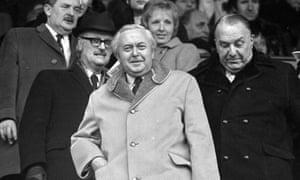 ‘In the 1970s, plots against Harold Wilson’s Labour government abounded.’ Photograph: Popperfoto/Getty Images
‘In the 1970s, plots against Harold Wilson’s Labour government abounded.’ Photograph: Popperfoto/Getty ImagesAs the Sunday Times political editor Tim Shipman put it to me, Theresa May is clinging on “because the Tories are genuinely fearful of a Corbyn government to a degree that goes far beyond usual opposition to Labour”. This panic is shared by other centres of economic and media power. It’s not simply Labour’s policy prospectus they fear. Three decades of neoliberalism – which promotes lower taxes on top earners and big business, privatisation, deregulation and weakened unions – has left them high on triumphalism. They find the prospect of even the most modest challenge to this order intolerable.
And unlike, say, the Attlee government, Labour’s leaders believe that political and social change cannot simply happen in parliament: people must be mobilised in their communities and workplaces to transform the social order. That, frankly, terrifies elite circles. Labour’s opposition to US dominance and a reorientation of Britain’s foreign policy is also viewed as simply unacceptable.
Here are threats to a Labour government to consider. First, undercover police officers. I’ve interviewed women who had relationships with undercover police officers with fake identities. They were climate change activists: the police had recruited individuals willing to sacrifice years of their lives and violate women to keep tabs on the environmental and direct action movements. If they were keeping tabs on small groups of activists, what of a movement with a genuine chance of assuming political power? Then there is the role of the civil service. Thatcherism transformed the attitudes of Britain’s state bureaucracy, particularly in the Treasury: the principles of free-market economics are treated by many senior civil servants as objective facts of life. One former Labour minister told me how, in the late 1990s, civil servants “informed” them that the Human Rights Act forbade controls on private rents. Those officials went on to propose benefit cuts that the Tories would later implement.
Every drop in the pound, every fall in the stock exchange will be hailed as a sign of economic chaos and ruin
Civil servants will tell Labour ministers that their policies are unworkable and must be watered down or discarded. Rather than blocking proposals, they will simply try to postpone them, hold never-ending reviews, call for limited trials – and then hope they are forgotten about. It will require savvy, streetfighting ministers to drive their agenda through.
Finally, those media outlets that cheered on Brexit and accused remainers of hysteria about the consequences, from day one of a Labour government will portray Britain as being in a state of chaos. Every drop in the pound, every fall in the stock exchange will be hailed as a sign of economic chaos and ruin. Demands for U-turns and a moderated agenda will become increasingly vociferous and backed by certain Labour MPs. The hope will be to disorientate, disillusion and divide Labour’s base.
All of these challenges can be overcome, but only by a formidable and permanently mobilised movement. An enthusiastic and inspired grassroots has already succeeded in depriving the Tories of their majority. It will play a critical role if Labour wins. International solidarity – particularly with the US and European left – will prove essential. Such a government will depend on a movement that constantly campaigns in local communities and workplaces. And yes, this is a column that will be dismissed as a tinfoil hat conspiracy. The British establishment has no interest in allowing a government that challenges its very existence to prove a success. These are the people in power whoever is in office, and they will bitterly resist any attempt to redistribute their wealth and influence. Better prepare, then – because an epic struggle for Britain’s future beckons.

